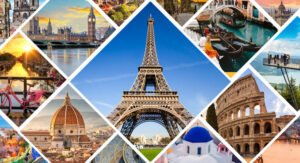
News Today: President Anura Kumara Dissanayake keynote Vesak 2025
President Anura Kumara Dissanayake keynote Vesak 2025 has captured global attention as a resounding call for peace, compassion, and sustainable development. Speaking at the 20th United Nations Day of Vesak Celebrations in Ho Chi Minh City, Vietnam, President Dissanayake delivered a powerful address urging the world to embrace Buddhist wisdom in extinguishing the flames of war and fostering global harmony.
Held from May 6th to 8th under the theme “Solidarity and Tolerance for Human Dignity: Buddhist Wisdom for World Peace and Sustainable Development,” this year’s UN Vesak event welcomed over 2,800 delegates from 85 countries. Key Buddhist nations like Sri Lanka, India, Nepal, Laos, and Cambodia were represented at high levels.
In his keynote, President Anura Kumara Dissanayake emphasized the global relevance of Buddha’s teachings, urging societies to adopt the Four Brahma Viharas—metta (loving-kindness), karuna (compassion), mudita (sympathetic joy), and upekkha (equanimity)—as foundational values for peacebuilding.
A Global Appeal for Compassion and Restraint
President Dissanayake’s message was clear: “In a world torn by conflict and inequality, only peace can lead to human dignity.” Drawing from Sri Lanka’s own painful history of war, he reminded the audience of the importance of inner transformation and moral governance, hallmarks of the Buddhist philosophy.
He also lauded Vietnam, the host country, calling it a “Land of Determination” for rising admirably from centuries of war. The President praised Vietnam’s resilience and its leadership in global Buddhist affairs.
The Legacy of Vesak at the United Nations
The President recalled how Sri Lanka proposed Vesak as a global observance at the UN in 1999, thanks to the late Foreign Minister Lakshman Kadirgamar. By 2000, Vesak was internationally recognized by the United Nations. Today, it stands as a symbol of peace and spiritual awakening for Buddhists worldwide.
Equality Through the Lens of the Dhamma
Underscoring the Buddha’s vision of equality and restraint, President Dissanayake warned that war only leads to the “destruction of human civilization.” With moving references to victims of war—children, women, and families—he reminded the global community of the Buddha’s message that peace is the only true victory.
He referenced how Sri Lankan society upholds Buddhist values, from blood donations seen as “dana” (giving), to organ donation practices and the country’s reverence for nonviolence.
Relevance of Buddhist Teachings Today
President Dissanayake reiterated that Buddhist teachings remain essential in navigating modern crises. He cited historical examples such as Emperor Ashoka’s reign, which shifted from conquest to Dhamma. He reminded the audience of the Buddha’s intervention to stop a war over river water among the Sakyans, underlining how peace always prevails in Buddhist doctrine.
The Dhamma, he said, arms people not with weapons, but with mindfulness, compassion, and wisdom—tools to fight inner enemies like anger, hatred, and delusion.
Dhamma and Governance
The President highlighted how Buddha’s teachings extended into political philosophy. He discussed the Dasa Raja Dharma (Ten Royal Virtues) as a moral compass for leaders, urging governance based on justice, compassion, and spiritual awareness. He echoed the Buddha’s insight: “When the ruler governs wisely, the people will live in peace and prosperity.”
Economic Ethics and Resource Management
In his address, Dissanayake shared the Sigalovada Sutta, where the Buddha gives practical financial advice: one portion of income for consumption, two for reinvestment, and one for emergencies. This centuries-old wisdom remains relevant in building sustainable economies.
International Buddhist Solidarity
Reflecting on Sri Lanka’s close ties with Vietnam, the President proudly spoke of the 2023 gifting of a Jaya Sri Maha Bodhi sapling to the Bai Dinh Pagoda. This act, he said, symbolizes deep spiritual and diplomatic bonds between the two nations.
He concluded with a call to action: “Let us walk the path of the Dhamma together, to build a world of peace, love, and mutual respect.”
The Dhamma’s Eternal Message
He ended his speech with a sacred verse summarizing the teachings of the Buddhas:
“Sabba papassa akaranan – Kusalassa upasampada
Sacchitapariyodapanan – Etam Buddhana Sasanan”
Meaning: Refrain from all evil, cultivate good, and purify the mind.




Leave A Comment